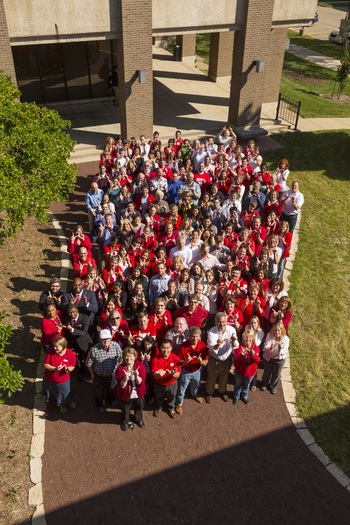WCER: Five decades of improving teaching and learning
One of the first centers of its kind, the Wisconsin Center for Education Research (WCER) is preparing to celebrate 50 years of educational policy research and initiatives.
In August 1964, the University of Wisconsin–Madison and the U.S. Office of Education established the center. From initial offices in a former grocery store and, later, a reconfigured dormitory, it has developed into one of the largest university-based education research centers in the world. WCER researchers have developed innovations in math education, approaches for teaching English language learners, sophisticated data-driven tools to improve teacher and school effectiveness, and educational computer games to promote equitable outcomes in education.

WCER employees, celebrating the center’s 50th anniversary, pose outside the Educational Sciences Building.
“A great challenge to an education research organization is to substantially influence practice,” says UW–Madison Chancellor Rebecca Blank. “WCER researchers have struck a wonderfully successful balance between breaking new intellectual ground and continually asking how educational ‘best practices’ can be made more efficient, better supported, more strategic and thus easier to implement.”
“Even the center’s most ardent supporters could not have predicted the impact that WCER would have in its first 50 years of existence,” says Julie Underwood, dean of UW–Madison’s School of Education. “The center is renowned throughout the world for its prolific track record of producing influential research.”
WCER also runs the School of Education’s Doctoral Research Program, which trains future education researchers. And through its network of 23 U.S. universities, including UW–Madison’s own Delta Program, the Center for the Integration of Research, Teaching and Learning (CIRTL) improves how college faculty teach diverse science, technology, engineering and mathematics learners.
“The future faculty of the nation are today’s graduate students,” says Robert Mathieu, WCER’s director and CIRTL’s principal investigator. “If we can enhance their graduate preparation in teaching, we will advance undergraduate learning at every college and university.”
WCER’s current emphases include establishing equitable outcomes and inclusion in education, as spurred by the work of the Minority Student Achievement Network (MSAN), the Wisconsin Equity and Inclusion Laboratory (Wei LAB) and the Wisconsin HOPE Lab. In addition, the rapidly growing WIDA provides services and materials for educators of English language learners in 37 states and 50 countries.
“Ultimately, our grand challenge will be addressed by sifting and winnowing through a rich diversity of ideas and through interdisciplinary collaboration both within and beyond WCER,” says Mathieu. “Research-based results can and must enlighten argument, challenge myth and inform decisions.”
WCER will celebrate its anniversary with a daylong symposium on Monday, Oct. 20. The symposium will conclude with an evening keynote address by Deborah Vandell, a former UW–Madison professor now at the University of California, Irvine. While at WCER in the 1990s, Vandell led a national research project disproving the myth that daycare negatively affects child development, and she is now an expert on the impact of afterschool activities on narrowing the academic achievement gap.
Vandell will speak at 8 p.m. at Monona Terrace in Madison.
—Paul Baker, Cliff White, Kurt Brown and Janet Kelly
Tags: education, learning, milestones, research, teaching




